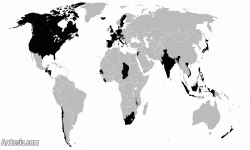“Hurt the feelings of the Chinese people”的版本间的差异
来自China Digital Space
| 第1行: | 第1行: | ||
| − | 伤害中国人民的感情 ( | + | 伤害中国人民的感情 (shānghài Zhōngguórén de gǎnqíng): hurt the Chinese people’s feelings |
| − | + | [[File:Hurt_feelings.png|250px|thumb|right|''Map of countries which have “hurt the Chinese people’s feelings.” ([http://www.arctosia.com/archives/511 Arctosia])'']]Chinese diplomats often invoke the people’s long-suffering feelings when another country or organization takes an action which offends Chinese Communist Party officials. Meeting with the Dalai Lama is a classic way to hurt the feelings of the entire Chinese populace. For example, after [http://chinadigitaltimes.net/2011/07/china-slams-u-s-interference-after-obama-meets-dalai-lama/ President Obama met with the Dalai Lama in July 2011], the state-run newspaper People’s Daily complained, “To host the Dalai Lama at the same time China was celebrating the 60th anniversary of Tibet’s liberation hurt the feelings of all Chinese people, including the feelings of Tibetans” (中國正在隆重慶祝西藏和平解放60周年,達賴堂而皇之成為白宮座上賓,不可能不傷害包括西藏人民在內的全體中國人的感情). | |
| − | + | In 2008, blogger [http://www.fangkc.cn/2008/12/donot-hurt-chinese/ FangK] searched through the electronic archives of the People’s Daily between 1946 and 2006 and discovered that 19 countries and organizations had been accused of hurting the feelings of the Chinese people in its pages. [http://www.danwei.org/foreign_affairs/a_map_of_hurt_feelings.php Danwei] later translated FangK’s study. Victor Mair considered the inverse at [http://languagelog.ldc.upenn.edu/nll/?p=3425 Language Log] in 2011, comparing the frequency of hurt Chinese feelings to those of Russians, Japanese, Jews, and other national and ethnic groups. | |
| − | |||
| − | |||
| − | |||
| − | |||
| − | |||
| − | |||
| − | |||
| − | |||
| − | |||
| − | |||
| − | |||
| − | |||
| − | |||
| − | |||
| − | |||
| − | |||
| − | |||
| − | |||
| − | + | Columnist Kai Pan considered these hurt feelings on the discontinued blog [http://cnreviews.com/life/society-culture/michael_arrington_hurt_feelings_of_european_people_20081215.html CNReview]: | |
<blockquote> The very notion of an entire country’s people having their “feelings” collectively “hurt” is inherently idiotic. On one hand, there’s the idiocy of the government proactively claiming such on behalf of all the Chinese without actually consulting them. On the other hand, there’s the simple idiocy of “you hurt my feelings” being mistaken for a mature, rational response to any disagreement or criticism. </blockquote> | <blockquote> The very notion of an entire country’s people having their “feelings” collectively “hurt” is inherently idiotic. On one hand, there’s the idiocy of the government proactively claiming such on behalf of all the Chinese without actually consulting them. On the other hand, there’s the simple idiocy of “you hurt my feelings” being mistaken for a mature, rational response to any disagreement or criticism. </blockquote> | ||
| − | + | No matter how pained the Chinese people’s feelings, international relations still manage to stay intact. When democracy activist [http://chinadigitaltimes.net/china/hu-jia/ Hu Jia] was awarded the EU Sakharov Prize in 2008, the Chinese ambassador to Brussels wrote, “If the European Parliament should award this prize to Hu Jia, that would inevitably hurt the Chinese people’s feelings once again and bring serious damage to China-EU relations.” To date, China-EU relations are still highly functional. | |
| − | + | <feed url="feed://chinadigitaltimes.net/china-news/main/world/feed/" entries="5"> | |
| − | + | == [{PERMALINK} {TITLE}] == | |
| − | + | '''{DATE}, by {AUTHOR}''' | |
| − | + | </feed> | |
| − | |||
[[Category: Grass-Mud Horse Lexicon]] | [[Category: Grass-Mud Horse Lexicon]] | ||
2013年3月27日 (三) 00:23的版本
伤害中国人民的感情 (shānghài Zhōngguórén de gǎnqíng): hurt the Chinese people’s feelings

Chinese diplomats often invoke the people’s long-suffering feelings when another country or organization takes an action which offends Chinese Communist Party officials. Meeting with the Dalai Lama is a classic way to hurt the feelings of the entire Chinese populace. For example, after President Obama met with the Dalai Lama in July 2011, the state-run newspaper People’s Daily complained, “To host the Dalai Lama at the same time China was celebrating the 60th anniversary of Tibet’s liberation hurt the feelings of all Chinese people, including the feelings of Tibetans” (中國正在隆重慶祝西藏和平解放60周年,達賴堂而皇之成為白宮座上賓,不可能不傷害包括西藏人民在內的全體中國人的感情).
In 2008, blogger FangK searched through the electronic archives of the People’s Daily between 1946 and 2006 and discovered that 19 countries and organizations had been accused of hurting the feelings of the Chinese people in its pages. Danwei later translated FangK’s study. Victor Mair considered the inverse at Language Log in 2011, comparing the frequency of hurt Chinese feelings to those of Russians, Japanese, Jews, and other national and ethnic groups.
Columnist Kai Pan considered these hurt feelings on the discontinued blog CNReview:
The very notion of an entire country’s people having their “feelings” collectively “hurt” is inherently idiotic. On one hand, there’s the idiocy of the government proactively claiming such on behalf of all the Chinese without actually consulting them. On the other hand, there’s the simple idiocy of “you hurt my feelings” being mistaken for a mature, rational response to any disagreement or criticism.
No matter how pained the Chinese people’s feelings, international relations still manage to stay intact. When democracy activist Hu Jia was awarded the EU Sakharov Prize in 2008, the Chinese ambassador to Brussels wrote, “If the European Parliament should award this prize to Hu Jia, that would inevitably hurt the Chinese people’s feelings once again and bring serious damage to China-EU relations.” To date, China-EU relations are still highly functional.
<feed url="feed://chinadigitaltimes.net/china-news/main/world/feed/" entries="5">
[{PERMALINK} {TITLE}]
{DATE}, by {AUTHOR} </feed>




